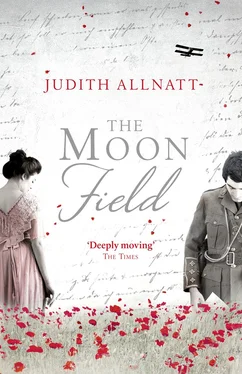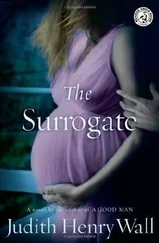‘Who’s that?’ George yelled at him over the din.
Haycock shrugged and turned round; walking backwards, he held out his arms to the girl and made a great show of tucking the flower into his buttonhole. He pulled a mock-woebegone face and then turned back to march on.
The band took a sharp left turn in the direction of the main road. A gap in the line of carts and motors opened for them and they joined the road and marched on towards the castle, a queue of traffic quickly forming behind them.
The castle was a huge medieval pile. Built of red sandstone, everything about it was square: the shape of the gatehouse, the lookout towers and the crenellations along the ramparts. The thickness of the walls was such that it almost seemed to have been hewn from solid rock. As they passed beneath the massive archway that led into a wide parade ground, all four young men felt a little over-awed; even Haycock’s swagger was less jaunty as he looked about him with curiosity. George thought about the soldiers who had passed through these barracks over centuries, all the feet that had drilled in this enormous, open square and marched out to do battle. He looked up at the corner towers and imagined the sentries posted there, scanning the surrounding countryside for the approach of opposing forces, preparing for a siege and determining to defend the fortress with their very lives. Wasn’t it something to be part of this history!
The band stopped playing and began to empty out their instruments. The soldiers directed the men towards the recruiting rooms on the other side of the square and the crowd began to disperse towards them. George nudged Turland to indicate to him the queue of men at an open doorway; in unspoken agreement, they all walked around the perimeter of the courtyard to reach it, suddenly shy of crossing the open space on the diagonal and drawing attention to themselves.
The men in their queue were of varied ages and occupations. Most wore the flat cap of the working man or carried their cap folded. Some had the rough-handed look of the labourer, with worsted jacket and heavy boots, whilst others had stiff collars, neat ties and an air of confidence about them.
The line of men moved along until they entered the hall. George could see that men were being called forward one by one to a row of desks, and old memories of school and the humiliation of being called in front of Mr Bevinson to explain himself returned for a moment, making him feel nervous. He moved back a little in the group so that Haycock would reach the front first.
When George’s turn came round, the corporal asked for his full name and occupation, and if he was willing to serve ‘for the duration’. He gave his details and said that he was willing. When he was asked his age, he said, ‘Eighteen years and three months.’
The corporal looked up sharply and said, ‘I’m sorry, I didn’t hear that. Did you say nineteen?’
George looked puzzled.
The corporal asked him, ‘Do you want to join the war?’
George nodded uncomprehendingly.
‘So you need to be able to take up service overseas, should the opportunity arise,’ he said patiently.
George vaguely remembered the conversation of the previous night in the taproom. ‘Sorry, nineteen and three months,’ he said quickly and the man gave him a weak smile, took down his address, asked him for a signature and then told him to stand in another line to one side. As he left the desk, he heard Rooke step up behind him and declare, as confidently as you like, that he was Percy Rooke, an apprentice baker and that he was born in 1895.
Rooke came over, wearing a non-committal expression. George knew that he must be delighted to have passed the first hurdle and marvelled at his ability not to show it. Rooke seemed always able to blend into the background; he carefully avoided attracting attention and his knack of adopting a deadpan expression made him less visible than those with more animated faces.
‘Why did you say you were a baker?’ George asked wonderingly. Rooke’s capacity for duplicity made him a mystery to George.
Rooke tapped the side of his nose. ‘Scoffum,’ he said. ‘If I can get taken on in the cookhouse I’ll always have plenty of grub.’
George wished that he had thought of that and wondered whether admitting to being a postman had been a good idea. Perhaps he would be asked to take messages. He didn’t quite like the idea of scouting around alone along the front line; he hoped he could stay with all the others.
When they reached the front of the second queue, Haycock again went in before George. He emerged a few minutes later, straightening his jacket, and gave George a broad wink. Before George had time to ask him what had happened, the sergeant, a dapper man with a neat moustache, ushered him in. He closed the door behind him, saying, ‘Take your clothes off and step on to the scales, please.’ A doctor in a white coat was finishing making some notes on a form. George stripped. It was cold in the room. He placed his clothes in a little pile on top of his boots, as there seemed to be nowhere else to put them, and stood with his hands folded over his private parts. As he stood on the scales, he glanced down at his pale body and saw, to his consternation, that a huge area of dark bruising had come out on his left side. The sergeant raised his eyebrows but said nothing, simply noting his weight, and then quickly taking his height and chest measurements.
The doctor came over to examine him. ‘Well-built lad,’ he said over his shoulder to the sergeant and then asked the question that George had been dreading. ‘How did you get this bruising?’
George didn’t know what to say. He could hardly say that he had been set upon and robbed. He felt his cheeks stinging as he thought of his humiliation, how he hadn’t even fielded a blow, much less aimed one in return. ‘It was an accident, sir,’ he blurted out.
The doctor looked at him keenly, clearly recognising a lie.
George heard the sergeant mutter, ‘Fighting, more likely. These young men have no self-discipline.’
‘Well, I don’t know,’ the doctor said mildly. ‘The recklessness of youth, though a nuisance in peacetime, can have its uses in wartime. Let the army sort him out.’ George, still smarting from being misrepresented as a roughneck, murmured a ‘Thank you, sir.’
The doctor told George to get dressed and then asked him to read some letters on a white board. George could read all bar the very last row. The doctor wrote something down on his form before asking George to show him his teeth; like a horse, George thought; then, more alarmingly: ‘I wonder if they can tell your age from your teeth?’ However, the form was duly signed and George was told that he could go. He left, feeling that the strict eye of the sergeant was still on him.
When Rooke and Turland had been through the same process, the four gathered once more.
‘I’m in,’ Rooke said, rubbing his sides. ‘I thought my ribs would bust, I took such a breath when my chest got measured.’
When a few others had joined them, they were taken into a room to swear the oath.
The adjutant who swore them in struck George as very fine. He had a strong physique and an upright bearing and his hair was cut very short and neat. His jacket was tightly fitted, and belt, boots and buttons were all polished to a high gloss. George was acutely conscious of the rip in his jacket pocket and the smear of soil on his rounded collar and longed to get out of his dirty clothes and become a proper soldier.
They stood in a row before the adjutant. He let his hand rest on a large, black Bible and stood to attention. He asked them to raise their right hand and swear to serve their King and country.
The room was very quiet afterwards. The officer let the silence linger to bring home to them the solemnity of the occasion and his eyes fell on each of them in turn, as if weighing up their character. George dared not glance around him but felt that every one of the group must feel as serious as he did. Then the adjutant relaxed his face and wished them luck. He gave them all a shilling and said that this was one day’s pay and meant that they were now deemed to be soldiers and subject to the King’s regulations. Rooke put his quickly in his pocket, as though afraid someone might realise they’d paid him three times his usual wage and take it away again. George thought that he would like to keep his as a kind of talisman but then remembered that he needed to give it to Mother.
Читать дальше












